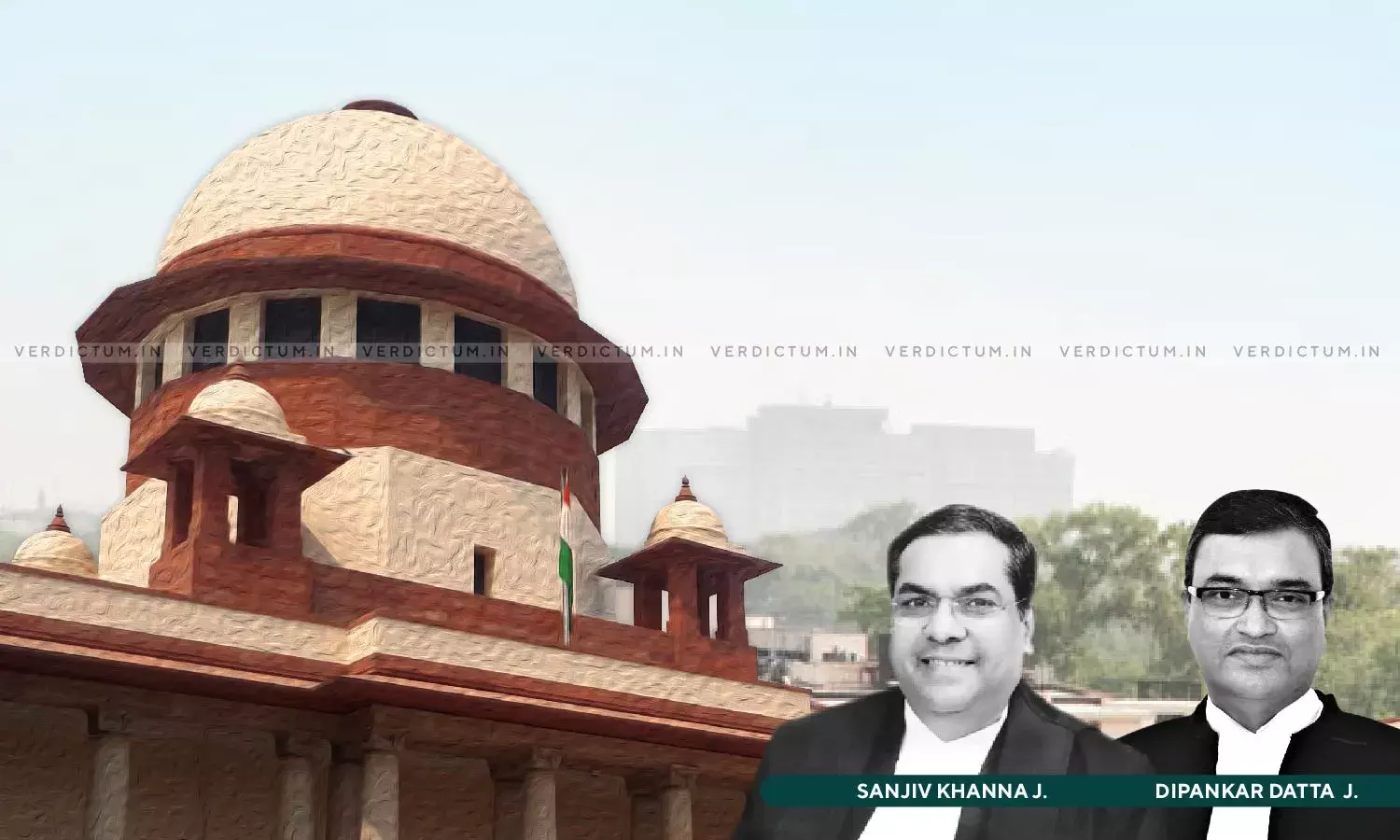SC Upholds Income Tax Rule Making Interest Free/Concessional Loan Benefits Provided To Bank Employees Taxable
The Supreme Court upheld the Income Tax Rule that makes the interest free or concessional loan benefits provided by banks to bank employees taxable.
The Court dismissed appeals that challenged Rule 3(7)(i) of the Income Tax Rules, 1962 and Section 17(2)(viii) of the Income Tax Act, 1961.
The Court was deciding a batch of appeals filed by staff unions and officers’ associations of various banks, against judgments of the Madras and Madhya Pradesh High Courts by which the writ petitions were dismissed.
The two-Judge Bench of Justice Sanjiv Khanna and Justice Dipankar Datta held, “This Court would not like to interfere with the legislation in question, which prevents possibilities of abuse and promotes certainty. It is not iniquitous, draconian or harsh on the taxpayers. A complex problem has been solved through a straitjacket formula, meriting judicial acceptance. To hold otherwise, would lead to multiple problems/issues and override the legislative wisdom. The universal test in the present case is pragmatic, fair and just. Therefore, Rule 3(7) is held to be intra vires Article 14 of the Constitution of India.”
The Bench said that when it comes to uniform approach, the laws relating to fiscal or tax measures enjoy greater latitude than other statutes and the Legislature should be allowed some flexibility in such matters. It added that the commercial and tax legislations tend to be highly sensitive and complex as they deal with multiple problems and are contingent.
AOR Rajesh Mahale represented the appellant while Senior Advocates Wasim Qadri, V. Chitambaresh and ASG N. Venaktaraman represented the respondents.
Background -
Section 17(2)(viii) of the Act includes in the definition of ‘perquisites’, ‘any other fringe benefit or amenity’, ‘as may be prescribed’. Rule 3 of the Rules prescribes additional ‘fringe benefits’ or ‘amenities’, taxable as perquisites, pursuant to Section 17(2)(viii). It also prescribes the method of valuation of such perquisites for taxation purposes. Rule 3(7)(i) of the Rules stipulates that interest-free/concessional loan benefits provided by banks to bank employees shall be taxable as ‘fringe benefits’ or ‘amenities’ if the interest charged by the bank on such loans is lesser than the interest charged according to the Prime Lending Rate of the State Bank of India. Section 17(2)(viii) and Rule 3(7)(i) were challenged on the grounds of excessive and unguided delegation of essential legislative function to the Central Board of Direct Taxes.
Rule 3(7)(i) was also challenged as arbitrary and violative of Article 14 of the Constitution insofar as it treats the PLR of SBI as the benchmark instead of the actual interest rate charged by the bank from a customer on a loan. Sections 15 to 17 of the Act relate to income tax chargeable on salaries. Section 15 stipulates incomes that are chargeable to income tax as ‘salaries’. Section 16 prescribes deductions allowable under ‘salaries’. Section 17 defines the expressions ‘salary’, ‘perquisites’ and ‘profits in lieu of salary’ for Sections 15 and 16. Section 17(1) includes in the definition of ‘salary’: wages, annuity or pension, gratuity, fee, commission, perquisites, or profits in lieu of or in addition to salary or wages, advance of salary, payments received by an employee in respect of leave not availed, annual accretion to the balance at the credit of the employee participating in a recognised provident fund, etc.
The Supreme Court in the above regard observed, “We are of the opinion that the enactment of subordinate legislation for levying tax on interest free/concessional loans as a fringe benefit is within the rule making power under Section 17(2)(viii) of the Act. Section 17(2)(viii) itself, and the enactment of Rule 3(7)(i) is not a case of excessive delegation and falls within the parameters of permissible delegation. Section 17(2) clearly delineates the legislative policy and lays down standards for the rule-making authority. Accordingly, Rule 3(7)(i) is intra vires Section 17(2)(viii) of the Act. Section 17(2)(viii) does not lead to an excessive delegation of the ‘essential legislative function’.”
The Court noted that Rule 3(7)(i) posits SBI’s rate of interest, that is the PLR, as the benchmark to determine the value of benefit to the assessee in comparison to the rate of interest charged by other individual banks. It said that the fixation of SBI’s rate of interest as the benchmark is neither an arbitrary nor unequal exercise of power and that the rule-making authority has not treated unequal as equals. It further said that the benefit enjoyed by bank employees from interest-free loans or loans at a concessional rate is a unique benefit/advantage enjoyed by them which is in the nature of a ‘perquisite’, and hence is liable to taxation.
“Rule 3(7)(i), it can be hardly argued, is arbitrary or irrational for the reason it benchmarks computation of the perquisite with reference to the SBI’s PLR. SBI is the largest bank in the country and the interest rates fixed by them invariably impact and affect the interest rates being charged by other banks. By fixing a single clear benchmark for computation of the perquisite or fringe benefit, the rule prevents ascertainment of the interest rates being charged by different banks from the customers and, thus, checks unnecessary litigation. Rule 3(7)(i) ensures consistency in application, provides clarity for both the assessee and the revenue department, and provides certainty as to the amount to be taxed. When there is certainty and clarity, there is tax efficiency which is beneficial to both the tax payer and the tax authorities. These are all hallmarks of good tax legislation. Rule 3(7)(i) is based on an uniform approach and yet premised on a fair determining principle which aligns with constitutional values”, it remarked.
Accordingly, the Apex Court dismissed the appeals and upheld the judgments of High Courts.
Cause Title- All India Bank Officers’ Confederation v. The Regional Manager, Central Bank of India and Others (Neutral Citation: 2024 INSC 389)
Appearance:
Appellant: AORs Rajesh Mahale, R. Chandrachud, Abhishek Atrey, and Sayid Marzook Bafaki.
Respondents: Senior Advocates Wasim Qadri, V. Chitambaresh, ASG N. Venaktaraman, AOR M/s. Mitter & Mitter Co., Advocates Gargi Khanna, Shashank Bajpai, Prahlad Singh, H. R. Rao, AORs Raj Bahadur Yadav, Harshad V. Hameed, Advocates Dileep Poolakkot, Ashly Harshad, Shivam Sai, AOR Rajesh Kumar Gautam, Advocates Anant Gautam, Samir Mudgil, Anani Achumi, Dinesh Sharma, Shivani Sagar, AORs Anuvrat Sharma, Badri Prasad Singh, Sanjay Kapur, Advocates Surya Prakash, Devesh Dubey, Divya Singh Pundir, Arjun Bhatia, Shubhra Kapoor, Isha Virmai, Mahima Kapur, AOR Surya Nath Pandey, Advocates Bahavi S. Patnaik, Hitesh Kumar Sharma, Amit Kumar Chawla, H. Pandian, Mahipal Singh, Subhashish Mohanty, AORs Radha Shyam Jena, and M/S. J S Wad And Co.













